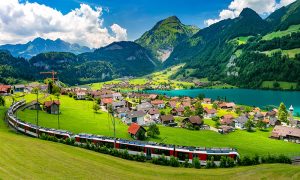In recent years, Germany, with its strong economy, excellent social benefits and high quality of life, has become the technologyimmigrantsof popular destinations. With the changing needs of the German labor market, in 2025 Germanyskilled migrantPolicies have also been adjusted accordingly. In this article, we will analyze in detail the popular industries, immigration paths and the latest application requirements, to help those interested inImmigration to Germanyof skilled people to plan for a smooth future.
I. Why Germanyskilled migrant?
Germany is the engine of the European economy and the demand for highly skilled people continues to grow. Below are the Germanskilled migrantThe main advantage of the
- High number of high-demand jobs: There is a labor shortage in Germany, and skilled people are especially sought after in fields such as IT, engineering, and healthcare.
- high salary package::skilled migrantStarting salaries are high, usually in the range of €45,000-€60,000+ per year, and up to €70,000+ in the IT and healthcare sectors.
- Generous social benefits: Enjoyment of social benefits such as free medical care, subsidized education for children, and unemployment insurance.
- Relaxed immigration policy: The German Government encourages skilled migration and offers long-term residence and fast-track naturalization.
II. Popular Industries and Demand in 2025
According to the German Federal Employment Agency (BA), the following industries will remain the most popular industries for skilled migrants in 2025:
1. IT and Software Engineering
Germany is making a big push towards digital transformation, and demand in the IT sector continues to rise, especially for the following positions:
- Software Development Engineer (Java, Python, C++, etc.)
- Data Scientist & AI Engineer
- Network Security Specialist
- Cloud & DevOps Engineer
Expected annual salary: €50,000-€90,000+
2. Engineering & Manufacturing
Germany is a major engineering and manufacturing country, and the following fields are the most popular:
- mechanical engineer
- Electrical Engineer
- Automobile manufacturing (especially new energy vehicles)
- Robotics and Automation Specialist
Estimated annual salary: €45,000 - €80,000+
3. Medical and Nursing
The following positions are in high demand in Germany due to an aging population and a shortage of talent in the healthcare industry:
- Nurses & Nursing Staff (Pflegefachkraft)
- Doctors (especially dental and surgical)
- Radiographers & Medical Technologists
Expected annual salary: Nurses €36,000+, Doctors €60,000-€100,000+
4. Green energy and sustainable development
Germany is at the forefront of renewable energy in the world, and the following specialties are favored:
- Solar & Wind Engineer
- Battery and Energy Storage Specialist
- Sustainable Building Designer
Expected annual salary: €50,000-€85,000+
Three,Skilled Migration to Germanythe main means of achieving the Millennium Development Goals (MDGs)
1. EU Blue Card
Applicable to highly paid technical personnel, application requirements include:
- Bachelor's or Master's degree recognized in Germany
- Ensure a salary of at least €45,300 per year (reduced to €41,000 in scarce sectors such as IT, mathematics, natural sciences, etc.).
- After 33 months of working in Germany with a Blue Card, you can apply for permanent residence (only 21 months if you have a B1 level of German).
2. Skilled Worker Visa (Germany)
For workers who are not highly paid but have skills in short supply, requirements include:
- Have a professional qualification or degree recognized in Germany
- Obtaining a work contract from a German employer
- Basic German language skills (usually at B1 level)
3. Freelancer Visa (FV)
Suitable for freelancers in IT, design, consulting and other industries, conditions include:

- Provide at least two letters of intent to cooperate from German customers
- Proof of sufficient funds to live on (usually €9,000-€12,000 deposit)
4. Job Seeker Visa for Germany
For skilled people wishing to come to Germany in search of work, application requirements:
- Bachelor's or Master's degree recognized in Germany
- Have at least 5 years of relevant work experience
- Proof of financial capacity (6 months of savings for living expenses, approx. € 5,000 - € 7,000)
- During the visa period (6 months), you can apply for permanent residence if you find a suitable job.
IV. Application Process and Preparation of Materials
Applying for skilled migration to Germany usually involves the following steps:
- Determine the appropriate visa type(Blue cards, skilled worker visas, etc.)
- Obtaining a work contract from a German employer(Job search through LinkedIn, StepStone, etc.)
- Degrees and professional qualifications(Certification through ZAB or Anabin required)
- Preparation of visa application documents(passports, academic certificates, work contracts, financial certificates, etc.)
- Apply for a visa(Applications submitted through German embassies abroad or VFS Global)
- Entering Germany after obtaining a visaand apply for residence registration, tax ID number application, health insurance registration, etc.
V. New changes in skilled migration to Germany in 2025
- Lowering the Blue Card threshold: The annual salary requirement for scarce occupations (e.g. IT) has been reduced to €41,000, allowing more people to qualify.
- Recognition of more non-EU vocational qualificationsIn addition, the certification process is accelerated, and skilled personnel have easier access to the German market.
- Simplification of visa proceduresThe German government plans to optimize the work visa approval process and reduce waiting times.
- Strengthening of the German language requirementFor some professions (e.g. nursing, education, etc.) the German language requirements may be increased.
VI. Summary
Germany's policy on skilled migration is being optimized to attract highly skilled people from around the world. Germany is an attractive migration destination for people with a technical background, especially in the fields of IT, engineering, healthcare and renewable energy.The new policy for 2025 lowers the thresholds for some sectors and opens up opportunities for more skilled people. If you are planning toImmigration to GermanyNow is a good time!







